UNHCR continues to innovate in its work with refugees, asylum seekers and host communities, and in 2018 for the first time, it tested out a new way of engaging NGO partners who are doing the same. The first-of-its-kind Innovation Awards recognized two local organizations: SINA Loketa, an organization that empowers youth to self-actualize in a Ugandan refugee settlement, and Artemisszió Foundation, which is creating an inclusive community space in Hungary.
UNHCR views the award itself as an experiment —a new way to see if the spirit of innovation can spread both out from the organization and into it from the field. The initiative represents a small piece of the puzzle as headquarters makes efforts to draw closer to field operations, and as the organization tests ways to foster ever more productive and creative partnerships.
“As an organization, UNHCR has already recognized that innovation is at the center for us to evolve together with partners,” says Rujia Yang, an Associate External Relations Officer for UNHCR and the focal point for the awards. “I’m proud to be part of this process because it shows not only how the partners innovate but the extent of the willingness UNHCR has to innovate along with them.”
Innovation everywhere
UNHCR received 165 submissions from 57 countries, judged by an international panel that included a refugee engaged in a community-based organization as well as representatives from the private sector, academia, and humanitarian networks.
The judges were on the lookout for organizations whose staff were truly committed to their work with refugees and other persons of concern, who had an innately innovative mindset and who showed the will and drive to test creative solutions.
“Sometimes people think innovation requires a high level of investment and that it needs to emanate from Geneva or other centers. But we were really looking for grassroots innovation,” says Yang. “It was an eye-opening experience that you could see these innovation activities everywhere, from urban settings to the deep field.”
Organizations also needed to truly understand the challenge they were proposing to address. They had to prove to the judges that it was the right time to experiment, with assistance from the award’s $10,000 prize. And they had to impress the jury with their capacity for sustained and future innovation. The call for submissions also required applicants to demonstrate how the plan for experimentation had been co-created or led by affected communities, with a focus on gender equality, inclusion and diversity.
“For this innovation (award), we wanted to be people-centered,” says Yang. “It’s not just about fancy ideas. We wanted to attach the idea and the testing of it to the ground and to the people who would be affected by the solutions.”
The Innovation Award was launched at UNHCR’s Annual Consultation with NGOs in June 2018, and the awards were presented to co-winners SINA Loketa from Uganda and Artemisszió Foundation from Hungary during the High Commissioner’s Dialogue in December.
Yang was happy to see the two winners worked with both refugee and host community populations. “I’m glad the two winners that were chosen are about building a community with a common vision and making sure refugees are part of the solution,” she says.
Solving problems in their communities
One of the award winners, Social Innovation Academy (SINA) Loketa, struck Yang with the way it empowers young refugees in Uganda to take charge and change the trajectory of their lives.
The SINA model operates in five other areas of Uganda and one in the Democratic Republic of Congo. The program works with young people who are marginalized, like street children, orphans, school dropouts, sex workers and former child soldiers. It helps them identify their skills and interests, and creates individualized plans that allow them to unlearn limiting thinking about their own potential while building their confidence and capacity to become leaders and social entrepreneurs.
In 2018, a SINA academy opened shop in Uganda’s Bidi Bidi refugee settlement. With a population of around 287,000 refugees who fled rekindled conflict in South Sudan in 2016, it is one of the largest refugee settlements in the world.
Although refugees in Uganda have freedom of movement and permission to work, youth unemployment nationwide is chronically cited as one of the most serious issues facing that age group. In Bidi Bidi, refugees reported poor quality teaching, a lack of essential classroom materials and severe teacher shortages. There is no vocational school in the settlement and limited opportunities for secondary or higher education.
SINA Loketa meets these challenges head-on. It works with both refugee and host community youth to create their own employment opportunities and found social enterprises that solve problems in Bidi Bidi and beyond.

“We don’t just teach people how to look for jobs, but we empower and support them based on their skills in a way for them to create jobs for themselves and be independent,” says Sylvain Himbana, SINA Loketa’s Co-Founder and Executive Director.
Himbana points to young people like Hakim, whom he described as “desperate” when Himbana first met him; Hakim was considering a return to South Sudan despite having escaped targeted and ongoing violence there. But through SINA Loketa’s workshops, Hakim discovered his talent and passion for photography and video. He formed a group of five other refugee storytellers who launched SINA Loketa’s first startup, an enterprise that now creates SINA Loketa’s visual content.
Another young South Sudanese refugee who participated in SINA Loketa created Genesis Agriculture, a small onion-growing enterprise that employs refugee women. They sell the onions wholesale to other refugee women to create capital for the farm, and those women in turn profit as well by reselling the onions in local markets.
With the modest Innovation Award prize money Himbana says, SINA Loketa will be able to give more refugee and host community youth the opportunity to participate in the life-changing program and do so without fear of failing. “We hope to bring more scholars on board with their brilliant ideas, give them all the necessary skills they need to start their own businesses and continue inspiring other refugees in the camp with their products and services,” he says.
Building a new kind of community
Award co-winner Artemisszió Foundation also puts change into the hands of refugees and community members. The organization won for its novel concept of “building a community where we all like to live together.” Instead of creating activities aimed at assisting refugees integrate into their new communities, Artemisszió created “Mira”, a new community with a common goal of inclusivity and diversity.
Few refugees are settling in Hungary today. Legislation there shifts often, creating confusion and a sense of unwelcome, and anti-immigrant sentiment and xenophobia are running high after top-down anti-immigration campaigns and propaganda. More tangibly, refugees in Hungary receive no social support from the government, meaning new arrivals are completely on their own when it comes to finding housing, learning the language and getting a job.
Artemisszió invites refugees and all other interested community members to participate in creating a different space. MIRA offers community programs from movie clubs, yoga workshops and cooking celebrations to a football club and language classes. Refugees don’t just take classes and learn from Hungarians, they are teachers themselves, giving Farsi and Arabic lessons, demonstrating how to cook traditional foods and modeling the right form for downward dog.
“We would like to move from the concept of integration into the concept of solidarity,” says Teréz Pataki, a project coordinator for Artemisszió. “We’d like to make a community where people can somehow rely on each other.”
Artemisszió is just starting to figure out the model and understand what community members want. It would like to expand offerings, including a mentoring program that allows refugees to get much needed social support. Pataki says the prize money will be used for this, but also to maintain a sense of security.
“I personally feel that this money, which is really about innovation and being creative which is essential in this context, will let us be more free in experimenting because we don’t need to be afraid that we don’t have money,” she says. “I think we got a little chance to be more creative in experimenting, and we got a bit more freedom.”
Although UNHCR will follow up with the winners to see how the prize money contributed to their operations, there are no strings attached.
“We were quite open and flexible that we didn’t need to see exactly what things are working,” says Yang. “Even if the winners encounter unexpected challenges or failures during the experiment and need to do something different, it is okay, because the innovation process is not a straight line. As long as the money helps them innovate, it’s meaningful.”
And although a plan to continue giving Innovation Awards in the future has not been announced, Yang says it is inspiring to know that organizations around the world are chipping away at the problems facing refugees and other persons of concern, and doing so in ways UNHCR never dreamed of.
UNHCR remains committed to innovating and encouraging even more partners to take an innovative approach to their work with refugees. Through the recognition of the Innovation Award, UNHCR hopes other NGOs will be inspired to keep experimenting, learning, and sharing.
We’re always looking for great stories, ideas, and opinions on innovations that are led by or create impact for refugees. If you have one to share with us send us an email at [email protected]
If you’d like to repost this article on your website, please see our reposting policy.

